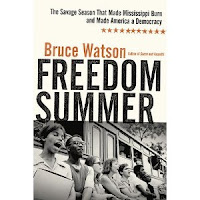
When you visit Mississippi these days, you’ll find quiet, welcoming communities in its forested hills, good food and good times along the river banks, people pitching in to rebuild from storm damage along the Gulf coast, and a highway named after Michael Schwerner, James Chaney, and Andrew Goodman, three civil rights workers who were murdered in Mississippi during the summer of 1964.
June, July, and August of 1964 in Mississippi. Deep south, deep summer, and deep in the midst of the changes in the ways people of different races related to and thought about each other on social, political, and spiritual fronts, changes that were shaking the soul of the deep south, and the nation. That summer, Mississippi was a crucible for this, as hundreds of white college students went south to join black civil rights workers to encourage and help blacks register to vote, and to teach children in summer schools called freedom schools. On the first day of Freedom Summer, Goodman, Schwerner, and Chaney disappeared in the course of investigating the burning of a black church. It was a time when people could, and did, lose their jobs, their homes, and their lives for trying to register to vote, for speaking the wrong way to the wrong person, and for coming south as part of Freedom Summer.
 Music was present in Freedom Summer. It was a connector that often provided a lifeline of hope. People found they could sing together across race and class and age and situation, and musicians came south to teach, to give concerts, and to offer their support. Bruce Watson mentions music only in passing in his recent book Freedom Summer. Reading his narrative and his interviews with people on all sides of the situation that summer in Mississippi reminded me, though, of a conversation I’d had with one of those who had put her life on the line.
Music was present in Freedom Summer. It was a connector that often provided a lifeline of hope. People found they could sing together across race and class and age and situation, and musicians came south to teach, to give concerts, and to offer their support. Bruce Watson mentions music only in passing in his recent book Freedom Summer. Reading his narrative and his interviews with people on all sides of the situation that summer in Mississippi reminded me, though, of a conversation I’d had with one of those who had put her life on the line.
Most of those who came south as volunteers in the summer projects and as musicians  giving concerts were from outside the south. Carolyn Hester, though, is a southerner, a native Texan. She was top folk singer who headlined festivals, appeared on the cover of the Saturday Evening Post, and toured the country and the world with her music. She still is, and she still does.
giving concerts were from outside the south. Carolyn Hester, though, is a southerner, a native Texan. She was top folk singer who headlined festivals, appeared on the cover of the Saturday Evening Post, and toured the country and the world with her music. She still is, and she still does.
We had been talking about her music career in the 1960s, and I asked her about Mississippi. “You almost didn’t want to stand up and say you were an American, if you didn’t go,” she said. “We sang in churches, we sang in people’s houses. It was hard, and it was scary, and we were staying in their homes, on their side of town, and making their lives more difficult and more dangerous. But it was all…” Hester paused to consider the right word “ …necessary. It was all necessary. I’m not sure we did anything except go there and say we see you, we love you, and we’re with you. I don’t know if we accomplished anything more than that. But we did do that.”
The two disc set Freedom Is a Constant Struggle is a way to hear what the music of that time and about that time and place sounds like. Voices range from the well known — Bob Dylan, Judy  Collins, Odetta, Phil Ochs, Sweet Honey in the Rock, and Hester among them — to the less widely known, and so do the songs. It’s a thoughtfully sequenced collection that balances topical songs with timeless ones, material handed down from the long tradition of spirituals with songs written about events and people of Freedom Summer. It balances emotion, too: anger, pride, despair, sorrow, hope, and connection to what it meant, and in many ways, still means to both black and white to carry the legacies of the American south in the civil rights years.
Collins, Odetta, Phil Ochs, Sweet Honey in the Rock, and Hester among them — to the less widely known, and so do the songs. It’s a thoughtfully sequenced collection that balances topical songs with timeless ones, material handed down from the long tradition of spirituals with songs written about events and people of Freedom Summer. It balances emotion, too: anger, pride, despair, sorrow, hope, and connection to what it meant, and in many ways, still means to both black and white to carry the legacies of the American south in the civil rights years.
Though it is, perhaps because it is, grounded in events and emotions of a singular place and time, the music resonates beyond that hot Mississippi summer all those decades ago.
Consider subscribing to our stories through e mail, and connecting with us through your favorite social networks. You will find links to do that in the sidebar — and while you’re at that social network exploring, we invite you to keep up with our adventures by liking the Perceptive Travel Facebook page.

I have the two CD set; listening to it is definitely a time trip back to the 60s, the mood. It is odd how familiar those songs were, yet for the most part, they received almost NO airplay.
Thanks for the post –it really got me thinking about those days …
passed on person to person most of the time rather than through radio, I think, Mark.